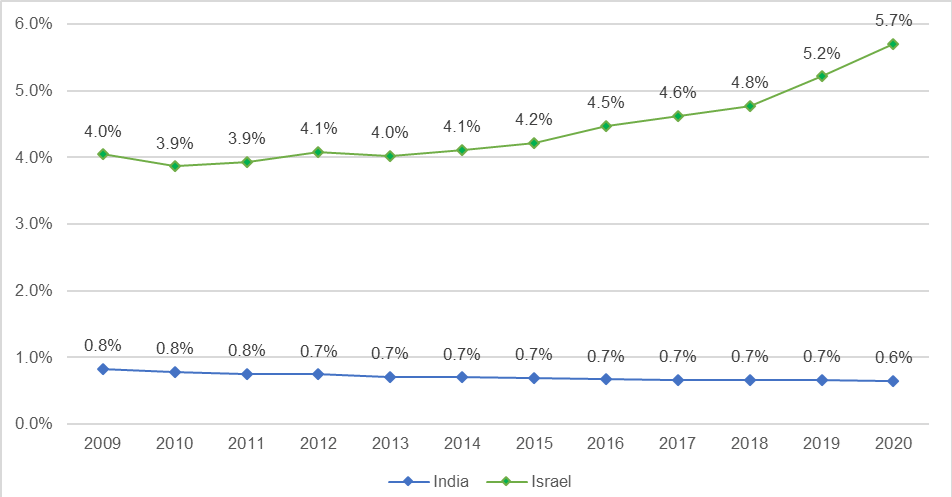Israel: It's Legacy of Innovation
I deep dive into the following questions of causality - What makes Israel unique? What are the key drivers that drive innovation and entrepreneurship in Israel?
ARTICLES


Shalom Israel
Israel is a country roughly one-eighth the size of our state of Karnataka and has a population of approximately two-thirds of Bengaluru. It is a country with limited natural resources and has been riddled with conflicts and security issues since its inception. Despite its shortcomings, it has more startups per capita than any other country. They have 7,000+ active startups, one for every 1,500 citizens of their country. What an astounding achievement. The Israel story is fascinating and has caught my imagination, and I deep dive into the questions of causality in this blog - What makes Israel unique? What are the key drivers that drive innovation and entrepreneurship in Israel?
What makes Israel unique?
Israel is a land of innovation; the world’s first USB drive, Instant messaging, and the very firewall that protects our computer from malware all came from Israel. They even have innovations that could purely be science fiction, like Watergen, where they generate drinking water from the moisture in the air. Anyone who is a fan of the cult classic and my favorite science fiction book series, Dune, would know how close to reality the windtraps the fremen used have become.
Rightly so, over 400 multinational companies, including Google, Meta, Microsoft, and Intel, have their innovation centers and R&D units in Israel. Reviewing various literature, I have boiled down the causality of thriving innovation to three key factors.
Cultural Values – Without leaning into the Jewish stereotype, Israel can be attributed to a culture where people are more accepting of risk. More importantly, it encourages debate, contrarian opinions, and questioning authority. Israelis have a mindset of military service taught to them; for a majority of them, it is compulsory to serve in the military when they turn 18. This inherently stretches their ability to reach their peak potential and also enhances their public service mentality, eventually resulting in excellence in the new ventures they work towards.
Government Support – The Israeli government spends a significant proportion of its GDP on R&D, 5.56% as of 2021, more than twice in proportion to what the world spends. In addition to this, it has strategic and impactful public policy initiatives to enhance its startup ecosystem. A couple of them are highlighted below.
Yozma Program – This program initiated in 1993 aimed to promote venture capital investments through public and private sources; it has redefined the landscape of equity investments and globalized them in subsequent venture rounds. This program currently boasts of creating 24+ Tech incubators, 39 Global IPOs (Initial Public Offering), and 29 US IPOs. These incubators nurture companies from seed to early stage, providing up to 85% of funding for two years. The bold initiative of the Israeli government to invest in the risk that is much needed for innovation has catalyzed their startups. This has also resulted in a thriving VC industry in Israel, with over 300 Venture capital firms now operating in their ecosystem.
Israeli Innovation Authority – The Israel Innovation Authority is an independent publicly funded agency, and it assists a spectrum of companies, from early-stage startups and academic groups to mature companies. It aims to assist them in their journey from idea to market and in fostering collaboration on a global scale for Israeli technology. It has six divisions, among which the Startup division is prominent. Scientific collaborations with CERN and climate tech collaborations with Bayer are noteworthy.
Academic Excellence – There is an increased tight coupling of academia and innovation in Israel; Tel Aviv University ranks second on the list of unicorn founders, second only to Stanford University in California. A significant proportion of startups, about 13%, come from universities as of 2020, a substantial increase from 3.2% in 2016. The Israeli Defense Forces (IDF) established their most elite unit of the Intelligence Corporation - Unit 8200, mainly comprising 18–21-year-olds. Through screening of all high school students approaching graduation, mavericks are chosen among them to be part of the four-year program. Alumni from these units of IDF go on to create high-tech startups, and the networking available within the units serves as a great melting pot of some of the best talent in the country. As of 2016, Forbes magazine estimates more than 1,000 startups are founded by 8200 Alumni. Companies such as Waze (Navigation and Mobility), Mirabilis (Instant Messaging), and Checkpoint (Cyber security) are all the resultants of this elite unit.
The Israel story has many more fascinating facts. Still, it is time for introspection: What can we learn from Israel? What is the current gap in our country in terms of innovation? What learnings can we take to improve our startup ecosystem?
Israel vs India
India is currently the third largest startup ecosystem in the world, and we have 27,000+ active tech startups with 103 unicorns (startups valued at over $1 billion). Israel has 7000+ startups, among which 98 are unicorns, and from the get-go, Israel’s startup Unicorn ratio is higher.
India also spends much less of its GDP on research and development, as seen in Figure 1. According to World Bank data, Israel has steadily increased the proportion of its spending, whereas India has had a marginal decline in the percentage of its expenditures. India comparatively spends a little over one-tenth (0.6%) of the proportion of what Israel (5.7%) invests in its R&D as of 2020.
Figure 1: Research and development expenditure (% of GDP)
Source: UNESCO Institute for Statistics (UIS), World Bank data
Many of Israel’s public policy initiatives assisting startups were kickstarted in the 1990s, whereas India’s flagship startup initiatives only began in 2016.
India has an expanding micro-VC landscape in its native venture capital system, which drives the seed and early funding stages. We have seen consistent growth in funding over the years. In contrast, Israel already has large, well-established VC firms that can make big bets on the startup ecosystem. To top this, the Israeli government invests a good proportion of the seed and early-stage funding.
Root thoughts
The Israel startup ecosystem is a story of resilience; in a country where natural resources are dire, desperation and perspiration have led to innovation. Key drivers are government policies encouraging risk and innovation, a culture that encourages debate and questioning authority, and a talent pool of excellent academia that is well harnessed. However, the recent October 7th attack by Hamas has brought in some hard reality checks for a country boasting such tech superiority. For a nation known for resilience and innovation, I am more than confident of them turning this setback into a blessing as well. Their legacy is bound to continue.
India is not far behind, given the recency of the evolution of our startup ecosystem, which spans just over a decade. The venture capital ecosystem is sure to mature in the near future, and further strengthening academic partnerships and more government investments in startups during the early stages will be crucial for the continued success of the startup ecosystem. As inspired as I am in understanding Israel’s story, I, for one, am thrilled to be part of our very own history in the making. A legacy unravels!


Photo by Levi Meir Clancy on Unsplash